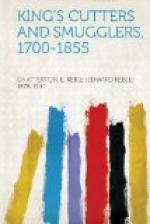[Illustration: “A great crowd of infuriated people came down to the beach.”]
But it was impossible to expect reason from an uncontrolled mob raging with fury and indignation. Soon the smugglers had opened fire, and ball was whistling through the night air. The Diana was now lying on her side, and several muskets were levelled at the Revenue men. One of the latter was a man named Dawkins, and the smugglers had got so close that one villainous ruffian presented a piece at Dawkins’ breast, though the latter smartly wrested it from him before any injury had been received. But equally quickly, another smuggler armed with a cutlass brought the blade down and wounded Dawkins on the thumb. A general engagement now proceeded as the smugglers continued to fire, but unfortunately the powder of the Revenue men had become wet, so only one of their crew was able to return the fire. Finding at length that they were no match for their aggressors, the crews were compelled to leave the lugger and retreat to some neighbouring barracks where the Lancashire Militia happened to be quartered, and a sergeant and his guard were requisitioned to strengthen them. With this squad the firing was more evenly returned and one of the smugglers was shot, but before long, unable to resist the military, the smugglers ceased firing and the beach was cleared of the mob.
The matter was in due course reported to the Board of Customs, who investigated the affair and ordered a prosecution of the smugglers. No one had been captured, however, so they offered a reward of L200. That was in the year 1805; but it was not till 1813 or 1814 that information came into their hands, for no one would come forward to earn the reward. In the last-mentioned year, however, search was made for the wanted men, and two persons, named respectively Jeremiah Maxted and Thomas Gilbert, natives of Lydd, were arrested and put on their trial. They were certainly the two ringleaders of that night, and incited the crowd to a frenzy, although these two men did not actually themselves shoot, but they were heard to offer a guinea a man to any of the mob who would assist in rescuing the seized property. Still, in spite of the evidence that was brought against these men, such was the condition of things that they were found not guilty.
But it was not always that the Revenue men acted with so much vigour, nor with so much honesty. It was towards the end of the year 1807 that two of the Riding officers stationed at Newhaven, Sussex, attempted to bribe a patrol of dragoons who were also on duty there for the prevention of smuggling. The object of the bribe was to induce the military to leave their posts for a short period, so that a cargo of dutiable goods, which were expected shortly to arrive, might be smuggled ashore without the payment of the Crown’s duties. For such a suggestion to be made by Preventive men was in itself disgraceful, and showed not merely




